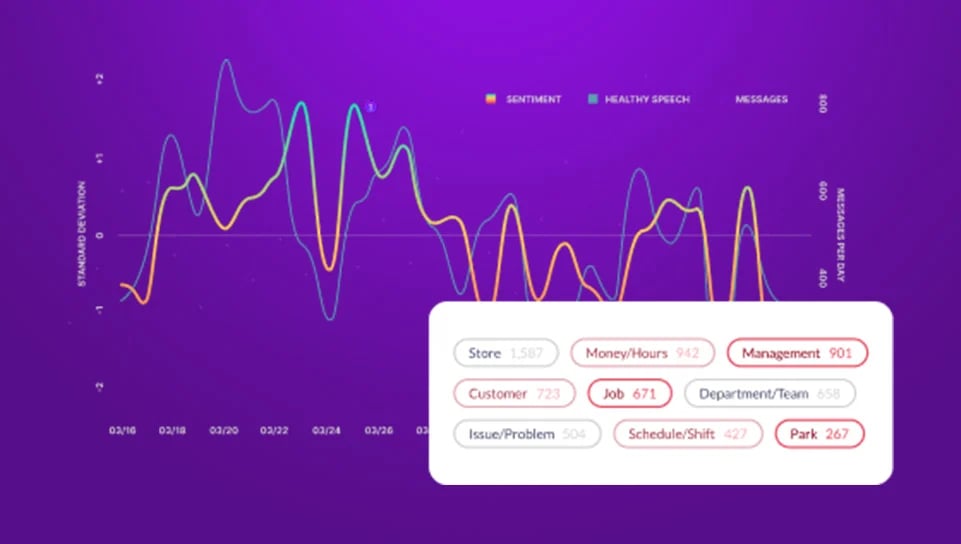The Best Onna Alternatives for Data Management and eDiscovery in 2024
Onna is a data management SaaS platform that consolidates business data from different apps and makes it accessible for eDiscovery, information governance, and LLM augmentation purposes. Using Onna, businesses can better navigate complex datasets such as collaboration, streamlining legal and compliance workflows and making the data more actionable.
Many businesses choose Onna for data management and eDiscovery because it enables a unified approach to multiple data sources across the enterprise. However, Onna may not be the best solution for every organization. In this article, we explore Onna’s capabilities, shortcoming, and alternatives so you can make an informed decision about which data management platform is best for you.
Contents
- How Onna Falls Short as an eDiscovery and Data Management Solution
- Onna Competitors for eDiscovery and Data Management
How Onna Falls Short as an eDiscovery and Data Management Solution
Although Onna offers many great features that enable legal and compliance teams to take better control of complex data sets, Onna’s solution does have some shortcomings compared to its competitors. For example, Onna does not offer data loss prevention (DLP) controls or bi-directional retention for purging or preservation of sensitive data and Onna’s lack of native AI models means it cannot provide advanced results filtering to reduce false positives or perform real-time sentiment analysis, both features offered by other competitors.
Onna relies on batch ingesting data from source, which can create gaps in the record through which bad actors and insider threats can move unnoticed—particularly in real-time collaboration data sets, when messages can be sent and deleted in seconds. Further, the necessity of batch ingesting data can slow down the discovery process, requiring data to be collected before it can be searched. When exporting or ingesting data at enterprise volume, users may find that some exports take a very long time or even fail midway.
Other shortfalls of Onna include:
- Lack of compliance monitoring with supervision
- No content quarantining and remediation
- Cannot surface unknown trending topics
- Lacking organizational network analysis (ONA)
- Per-TB storage pricing for data can quickly add up
Finally, Onna was acquired by Reveal in May 2024, a move that raises critical questions about the ownership and use of data previously ingested by Onna, the product's roadmap going forward, and how the software will be bundled and sold in the future.
“Requires some planning on the user's part, particularly for larger data sets, to ensure collections can be completed in a timely manner while being mindful of any data usage constraints.”
“The time for Google products to sync into Onna is painfully long. It is hard to explain to outside counsel that we need multiple weeks to sync data before we can even start to run searches, export to a traditional ediscovery vendor, etc.”
"Sometimes when exporting search results, especially more considerable amounts of results, the export will hang, giving very little clue as to why. It also often takes several hours to get notified that the export failed."
Onna Competitors for eDiscovery and Data Management
Onna Alternative: Aware
Aware is an AI-powered platform that connects natively to workplace collaboration tools such as Slack, Microsoft Teams, Outlook Exchange and Workplace from Meta via APIs and web hooks to provide real-time federated search, compliance monitoring, information governance, and people insights. Businesses choose Aware to support multiple use cases across the organization, from eDiscovery and data loss prevention to content moderation and insider threat mitigation.
Aware for eDiscovery
Aware enables fast, accurate eDiscovery and early case assessment by ingesting unstructured data in real time and preserving it in a search-ready state without any hidden storage costs or extra fees. Continuous ingestion means Aware captures a complete record of all messages, including modifications and deletions, enabling legal officers to create contextual data holds that prevent negligent spoliation of evidence.
Aware’s proprietary artificial intelligence and machine learning models, backed by the industry’s most accurate natural language processing (NLP), further infuses results with sentiment and topic insights that deliver more flexible search parameters for faster discovery, greater context, and reduced false positives.
Aware’s approach to eDiscovery consolidates and processes data from multiple sources into a centralized platform, augmented by AI metadata that expands search parameters for faster identification of relevant data. This allows teams to quickly and effectively review multiple complex data sets with a single search. Using these capabilities, businesses can improve their risk posture and reduce the expenses associated with litigation and discovery by streamlining enterprise search, collection, and review into a single pane of glass that connects seamlessly to existing legal and eDiscovery tools and workflows.
Aware for data management
The digital transformation brought with it unprecedented data complexity and sprawl. Aware simplifies the management of disparate data sets with AI-enhanced controls powered by purpose-built models that help companies administer their digital workspaces from end to end, resulting in seamless collaboration across distributed teams that preserves knowledge management and protects proprietary data.
From a single, central platform secured by enterprise-grade security, including role-based access and audit logs, businesses can create granular rules and policies to govern the ways data moves through digital collaboration tools. Real-time ingestion and continuous compliance monitoring built for each unique workplace surface more policy violations with fewer false positives, giving compliance and security leaders the insights they need to take decisive action when company data is at risk.
To simplify data management, DLP, governance and compliance, Aware offers a comprehensive automation library that connects to existing workflows across the enterprise for faster, simpler risk mitigation.
Learn More
Aware for legal teams
A simplified, defensible eDiscovery workflow purpose-built for Slack, Microsoft Teams, Workplace by Meta Zoom and others.
Aware for compliance teams
Improve compliance posture, minimize regulatory exposure and protect your company with AI-powered compliance capabilities.
Aware for security teams
37% of all collaboration messages contain security risks. Identify, surface and address these threats quickly and accurately.
Aware for IT teams
Satisfy security, compliance and legal requirements with Aware's integrated solution. Cut through the red tape and administer successful collaboration at scale.
Onna Alternative: Hanzo
Hanzo provides legal teams with eDiscovery solutions that capture and consolidate data from apps like Slack and Microsoft Teams, preserve it in place, and export efficiently and defensibly. Hanzo uses Dynamic Capture technology to identify relevant data prior to ingestion, reducing the time spent collecting and archiving data prior to review. However, these features may result in some data being overlooked and the full text never becoming part of the discovery record.
Additionally, Hanzo partners with Nightfall to provide data loss prevention controls for collected discovery data and supports more granular review with advanced data classification capabilities. While users like Hanzo’s responsiveness and the quality of its available features, some reviewers feel that the learning curve for the Hanzo platform is too steep, requiring advanced knowledge to set up and fully utilize. Additionally, Hanzo’s solution may struggle to handle enterprise-scale data volume.
Onna Alternative: Logikcull
Logikcull is a legal holds and eDiscovery software also owned by Reveal. Logikcull connects natively to tools like Slack and Box and ingests data in response to legal investigations. A key functionality of Logikcull is its ability to deduplicate data, reducing results volume, and to sort data into predefined filters such as document types or potentially sensitive information. This supports features such as faster tagging for privilege and bulk reactions.
While Logikcull provides legal teams with the tools to handle more investigations in-house without relying on IT teams to find and manage the data, it does have some limitations. For example, Logikcull, like Onna, performs ad-hoc data ingestion in response to searches, which can slow down discovery and result in modified or deleted data being lost. Additionally, Logikcull’s acquisition by Reveal raises questions about future product strategy and who exactly owns and manages the data that companies upload into its platform.
Onna Alternative: Nextpoint
Nextpoint is a cloud-based eDiscovery platform that consolidates data from multiple sources for more streamlined early case assessment. Users can drag and drop files into Nextpoint or ingest data from apps like Slack or Microsoft Teams. Like Onna and Logikcull, Nextpoint’s data collection methods are query-based, not continuous. Nextpoint’s primary benefit is its document review workflow, which reduces the time legal officers spend in discovery.
Nextpoint offers two types of user plan, project-based for one-time discovery requests and all-access for businesses with ongoing legal needs. Both plans come with unlimited data storage and free data hosting, eliminating some of the hidden costs associated with other platforms. However, Nextpoint lacks technology assisted review (TAR) features offered by competitors, and some users feel the software is not intuitive and has a steep learning curve, which may be particularly problematic for one-time users.
Onna Alternative: Relativity
Relativity’s eDiscovery platform supports organizations managing large volumes of data in legal cases. Using Relativity, legal teams can collect and import data and leverage AI capabilities to quickly identify critical documents. Relativity is available in 17 countries and supports translations to over 100 languages, enabling unified project management that makes it easier for global teams to work collaboratively on early case assessment and review.
Users appreciate Relativity’s customizable suite of built-in tools and automations. However, Relativity is typically more expensive than other eDiscovery platform solutions, and many of its more advanced features and capabilities come at a higher price point, which may put them out of reach of small businesses. Reviewers also note that Relativity’s cloud-based application can be slow or prone to crashing, and the need for a constant internet connection means legal teams cannot impose a secure air gap while reviewing sensitive data.
Final thoughts
When considering Onna alternatives for eDiscovery and data management, it’s important to ask several key questions:
- Does the software solution support continuous data ingestion, or can it only perform ad-hoc uploads or batch ingests?
- Does the solution offer data governance and DLP protections as standard, or are they only available through other tools and services?
- How does the solution consolidate data and support review? Does it offer AI filtering capabilities to reduce the workload?
- Is the solution easy for end users to adopt or does it involve significant training or steep learning curves?
- Can the solution scale with the enterprise and if so, are there any associated hidden costs?
By considering each eDiscovery and data management platform in relation to your specific needs and being proactive about understanding how data is ingested, collected, stored, and accessed, legal and security teams can make an informed decision about the right software to meet their needs.








